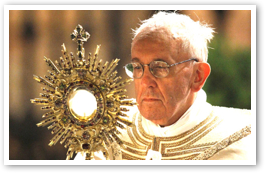Corpus Christi
- FATHER GEORGE W. RUTLER
When Jesus had given instructions sending two of his disciples into Jerusalem where they would find an upper room in which he would institute the Eucharist, "The disciples went out and came to the city, and found everything just as he had told them" (Mark 14:16).
 |
Similarly, the liturgical cycle follows a pattern based on this economy that was planned and predicted by God. Ten days after the celebration of the Ascension, the Church celebrates her birth in the flames and wind of the Holy Spirit at Pentecost. And then comes Trinity Sunday. We can only know that God is Three in One and One in Three — three distinct Persons with one and the same divine Nature, after the Holy Spirit enlightens the Church. "But when the Spirit of truth comes, he will lead you into the whole truth" (John 16:13).
Now the Church celebrates the mystery of the Holy Eucharist with the special feast of Corpus Christi. The feast is liturgically celebrated on the Thursday after Trinity Sunday or, as the rubrics direct: "where the Solemnity of the Most Holy Body and Blood of Christ is not a holy day of obligation, it is assigned to the Sunday after the Most Holy Trinity as its proper day."
We see that, just as the liturgical feasts follow a pattern, so too is the Eucharistic liturgy structured in a deliberate way. Usually, the opening prayer addresses the almighty and eternal God precisely by that title, as he revealed himself to the chosen people, identifying himself to Moses as the "I AM." The Holy Spirit is invoked over the gifts of Bread and Wine, and these are then discerned by the agency of the same Holy Spirit as Christ's true Body and Blood. Then, the inspired faithful are able to pray to God as "Our Father who art in heaven." The title "God" is now replaced by the intimate identity he has revealed. "Because you are his sons, God sent the Spirit of his Son into our hearts, the Spirit who calls out, 'Abba, Father'" (Galatians 4:6; cf. Romans 8:15). As Pope Francis recently said, ". . . the Eucharist is like the 'burning bush' in which the Trinity humbly dwells and communicates itself: this is why the Church has placed the feast of the Body of the Lord after that of the Trinity." So the Eucharist encounters the inner mystery of the I AM as the Triune God.
I recently was at the deathbed of a friend who spent time in a Nazi prisoner-of-war camp, and for the rest of his life he thanked the Holy Trinity by regularly attending Nocturnal Devotion, for nearly seventy years. While only mortal, kneeling before the Blessed Sacrament, he had the inestimable privilege that all of us have, of singing with all the angels and saints: Kadosh, Kadosh, Kadosh. Sanctus, Sanctus, Sanctus. Holy, Holy, Holy.
 This is Meaghen Gonzalez, Editor of CERC. I hope you appreciated this piece. We curate these articles especially for believers like you.
This is Meaghen Gonzalez, Editor of CERC. I hope you appreciated this piece. We curate these articles especially for believers like you.
Please show your appreciation by making a $3 donation. CERC is entirely reader supported.

Acknowledgement
Father George W. Rutler. "Corpus Christi." From the Pastor (June 22, 2014).
Reprinted with permission of Father George W. Rutler.
The Author
 Father George W. Rutler is the pastor of St. Michael's church in New York City. He has written many books, including: The Wit and Wisdom of Father George Rutler, The Stories of Hymns, Hints of Heaven: The Parables of Christ and What They Mean for You, Principalities and Powers: Spiritual Combat 1942-1943, Cloud of Witnesses — Dead People I Knew When They Were Alive, Coincidentally: Unserious Reflections on Trivial Connections, A Crisis of Saints: Essays on People and Principles, Brightest and Best, and Adam Danced: The Cross and the Seven Deadly Sins.
Father George W. Rutler is the pastor of St. Michael's church in New York City. He has written many books, including: The Wit and Wisdom of Father George Rutler, The Stories of Hymns, Hints of Heaven: The Parables of Christ and What They Mean for You, Principalities and Powers: Spiritual Combat 1942-1943, Cloud of Witnesses — Dead People I Knew When They Were Alive, Coincidentally: Unserious Reflections on Trivial Connections, A Crisis of Saints: Essays on People and Principles, Brightest and Best, and Adam Danced: The Cross and the Seven Deadly Sins.




